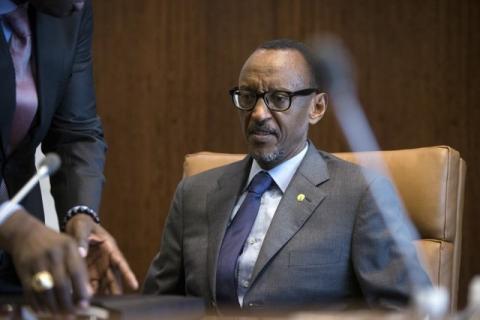Advertisement
Rwandan president calls claims of refugee recruitment "childish"
KIGALI (Reuters) - Rwandan President Paul Kagame dismissed accusations on Tuesday that he was supporting efforts by a rebel group to recruit Burundian refugees, calling the charges "childish."
The accusations, which emerged earlier this month, highlighted tensions between the central African neighbours, which each have an ethnic Hutu majority and Tutsi minority and a similar history of being torn apart by ethnic conflict.
"I think this is just childish," Kagame told a news conference in the Rwandan capital Kigali.
More than 220,000 people have fled Burundi since April, when President Pierre Nkurunziza's bid for a third term sparked a failed coup and months of protests. Hundreds have been killed amid growing fears that the nation could be headed to civil war.
Rwanda says more than 73,000 Burundians are now on its soil.
Earlier this month, the charity Refugees International issued a report stating that Burundian refugees in Rwanda were being recruited by "non-state armed groups."
Edouard Nduwimana, deputy speaker of Burundi's national assembly, told parliament on Monday that Rwanda was "destabilising our country through recruitments, trainings and equipping elements of the coup-plotters with weapons."
But Kagame appeared to reject the Refugees International report, saying non-governmental organizations have levelled baseless, politically-motivated allegations against Burundi.
"They talk about Rwanda giving them guns to go and fight in Burundi. I haven't seen any evidence, not the tiniest evidence to prove that," he said.
No explanations have been offered as to why Rwanda, scene of a genocide in which 800,000 mostly Tutsis as well as moderate Hutus were massacred, would want to support a rebel group against Burundi.
Rwanda has enjoyed international praise for rebuilding its economy after the 1994 genocide. Burundi, which is far poorer, has been in turmoil for months after a decade of relative calm since a 12-year civil war ended in 2005.
Meanwhile, a chorus of Burundian officials have spoken out against a plan to deploy 5,000 African Union peacekeepers in the country to protect civilians caught in the crisis, calling it an "invasion" and a violation of Burundi's sovereignty.
Opponents of Burundi's government have said the country needs peacekeepers to end the violence.
"Troops are needed to stop killings and protect citizens who are continuously dying," Issa Bigirimana, spokesman of the opposition FRODEBU Nyskuri party, told Reuters.
"When the law enforces fail to protect the population, then one should resort to the foreign troops."
(Additional reporting by Edmund Blair; Writing by Edith Honan; Editing by Mark Heinrich)



















Add new comment